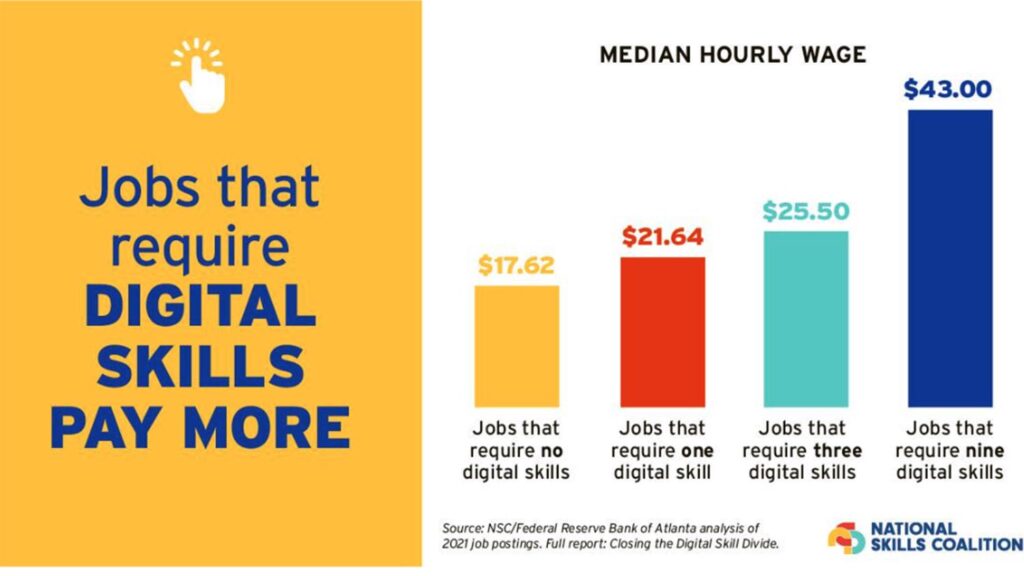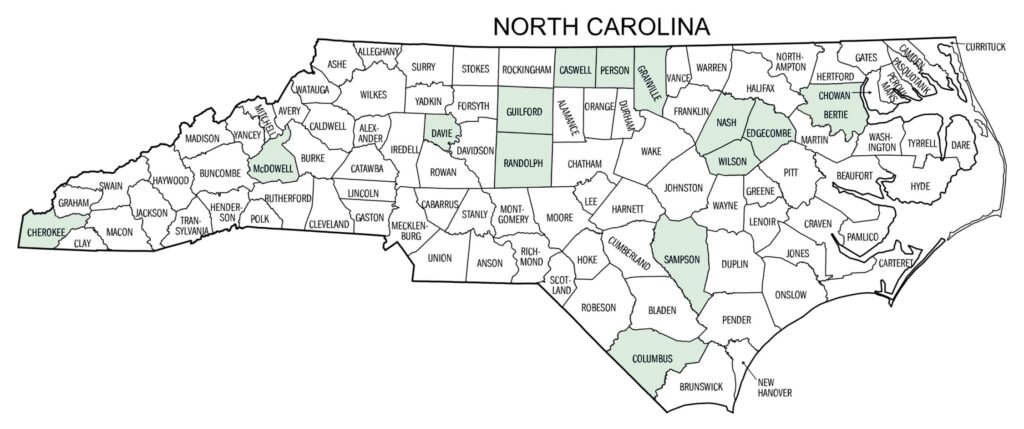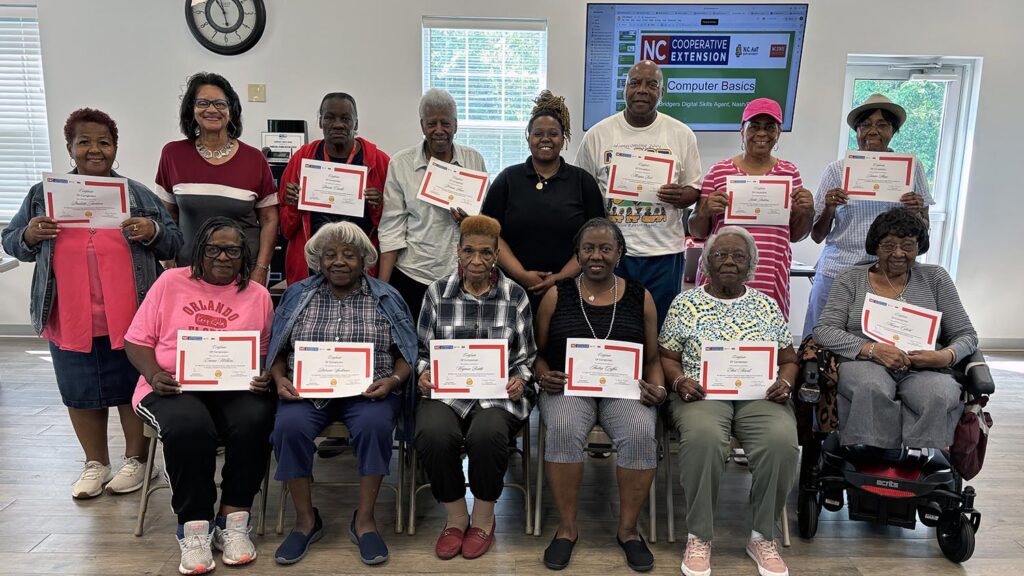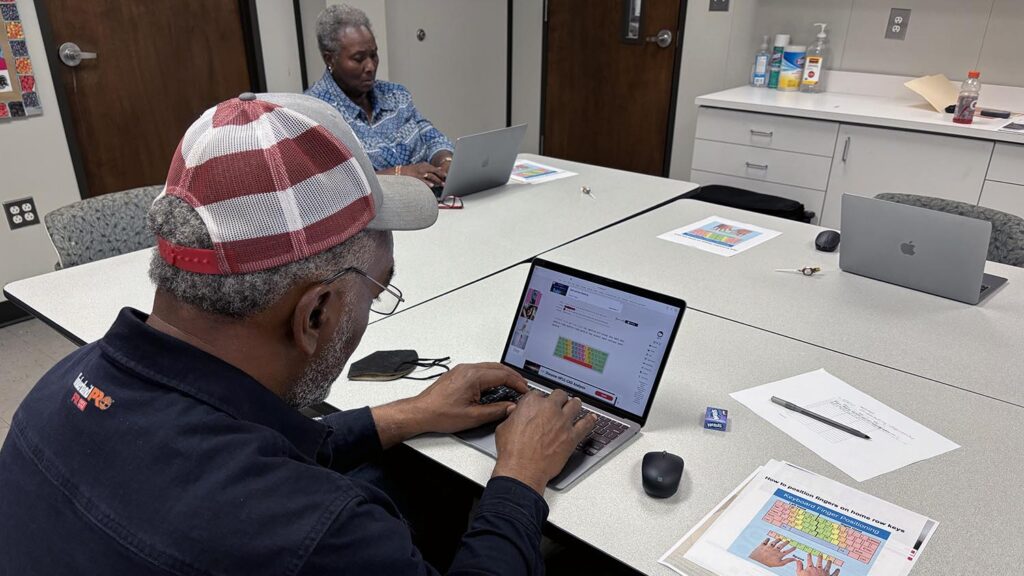NC State Extension Agents Help Close the Digital Divide
go.ncsu.edu/readext?1018804
en Español / em Português
El inglés es el idioma de control de esta página. En la medida en que haya algún conflicto entre la traducción al inglés y la traducción, el inglés prevalece.
Al hacer clic en el enlace de traducción se activa un servicio de traducción gratuito para convertir la página al español. Al igual que con cualquier traducción por Internet, la conversión no es sensible al contexto y puede que no traduzca el texto en su significado original. NC State Extension no garantiza la exactitud del texto traducido. Por favor, tenga en cuenta que algunas aplicaciones y/o servicios pueden no funcionar como se espera cuando se traducen.
Português
Inglês é o idioma de controle desta página. Na medida que haja algum conflito entre o texto original em Inglês e a tradução, o Inglês prevalece.
Ao clicar no link de tradução, um serviço gratuito de tradução será ativado para converter a página para o Português. Como em qualquer tradução pela internet, a conversão não é sensivel ao contexto e pode não ocorrer a tradução para o significado orginal. O serviço de Extensão da Carolina do Norte (NC State Extension) não garante a exatidão do texto traduzido. Por favor, observe que algumas funções ou serviços podem não funcionar como esperado após a tradução.
English
English is the controlling language of this page. To the extent there is any conflict between the English text and the translation, English controls.
Clicking on the translation link activates a free translation service to convert the page to Spanish. As with any Internet translation, the conversion is not context-sensitive and may not translate the text to its original meaning. NC State Extension does not guarantee the accuracy of the translated text. Please note that some applications and/or services may not function as expected when translated.
Collapse ▲We are living in what could be called the golden age of technology.
The ubiquitous mobile phones nestled comfortably in our palms have evolved from mere communication tools to devices with cameras that rival the quality of high-end digital SLRs, that help us navigate to unfamiliar destinations, and give us virtually instant access to a wealth of information.
Slim, portable laptop computers and tablets enhance productivity even outside a traditional work environment while doubling as entertainment centers, streaming movies and TV shows wirelessly on crystal clear high-definition screens.
It’s easy to take it for granted. Using our devices comes naturally for those who grew up with technology, or who have had the opportunity to adapt to it over the years.
But for those new to it, navigating the digital world can be a confusing muddle.
“When digital devices and connectivity have been lacking for so long in so many places, or it’s new because when you were younger the highest tech thing you had was a radio, it doesn’t come as naturally to you,” said Kenny Sherin, NC State Extension’s Community and Economic Development program manager. “It’s like language. When you are in an English-speaking home, you learn English. When you’re in a Spanish-speaking home, you learn Spanish. When that technology is not present that you absorb like you do language, it takes effort.”
As broadband access and broadband coverage is more available throughout North Carolina, the digital knowledge gap becomes increasingly evident. What seem like basic everyday tasks in a connected age can be foreign concepts for people who are new to the technology.
“That’s what happens when a resource has been at a deficit at some time in your life,” Sherin said.
Sherin has been involved in digital skills outreach efforts for about three and a half years. A year ago, NC State Extension received a grant from the North Carolina Department of Information Technology (NCDIT) that enabled him to hire new full-time digital skills agents and train existing agents to add digital skills education to their duties.
Some of the agents are helping implement cutting-edge technologies, including working with farmers to beta-test innovations related to cover crops, precision pest ecology, sensor development and disease diagnostics.
But the biggest application is education to help those who are unfamiliar with technology and connectivity thrive in today’s world.
“Everything takes place online,” Sherin said. “You apply for jobs online. You interact with your county government online. You apply for benefits, you pay bills online. All those things that used to be done through the mail or in-person now happen online. What we’re doing with digital skills education is giving people the know-how so they can earn, learn, be well and live well in this new digital economy.”

Digital skills education is key to economic improvement.
With offices in all 100 counties in North Carolina and the Eastern Band of Cherokee Indians, NC State Extension is uniquely equipped to help. Digital skills education is a relatively new field, but thoroughly aligns with Extension’s mission of transforming science into everyday solutions that improve the lives of North Carolinians.
“If you look at the history, Extension was started to help society adapt new technologies to farming and into the home,” Sherin said. “Digital skills education is exactly the same thing. It’s helping society adapt to a new way of being.”
With infrastructure and expertise in place, Extension is perfectly positioned to provide practical assistance. Digital skills agents such as Hannah Bradley in Randolph County can build on relationships established by other agents.
“The senior center is already accustomed to the Family and Consumer Sciences agent coming to do cooking demonstrations or nutritional education,” Sherin said. “Hannah comes along and shows them how to find trusted sources on the internet for recipes and how to stay safe online while you’re looking for those recipes. Hannah also goes to the housing authority office with the 4-H agent and she’s able to add digital skills education for children.”

NC State Extension digital agents primarily serve rural areas of North Carolina that have lacked broadband connectivity.
NC State Extension has seven full-time digital skills agents, and six who incorporate digital skills education within other programming. An additional three are members of the N.C. PSI Extension Agent Network and are creating farms of the future by helping producers adopt digital agriculture tech in areas new to broadband connectivity or in places where connectivity is still lacking.
Related: Connecting Extension agents to emerging agriculture technology
“Farms in rural areas have not had a lot of connectivity, so it’s taking effort to adopt new technology,” Sherin said. “We have this technology, but how is the connectivity on your farm and how does that impact the ability to implement this new technology?”
Kyn Bridgers is one of the full-time Extension agents hired with funding from the NCDIT grant. She serves as the digital skills agent for Edgecombe and Nash counties. Both are rural counties with areas that have lacked broadband access.
“I am responsible for bridging the gap to digital resources, broadband access and digital skills training,” she said. “I have been working with individuals who are reentering the workforce, aging individuals whose objective is to obtain digital skills, and students who are interested in STEM.”
Much of the work takes place in the community. She has presented STEM (science, technology, engineering and mathematics) curriculum to fifth-graders at a local school, worked with an internet service provider to teach a computer basics course at a church and a senior center, and worked with other community organizations to deliver one-on-one sessions on topics including computer basics, introduction to artificial intelligence, video calling, an internet safety course, and a LinkedIn workshop.

NC State Extension digital skills agent Kyn Bridgers teaches a computer basics course in Edgecombe and Nash counties.
Employability skills are an emphasis of the statewide program.
“The more digital skills you have, the greater your salary is,” Sherin said. “As they learn more, they can earn more.”
More than 90% of North Carolina jobs require a digital skill, according to the National Skills Coalition, but the NCDIT estimates more than 1 million adults in the state lack the needed skills.
Jeffrey Cates in Guilford County has built a relationship with NCWorks to provide jobseekers with digital skills to increase their employability.
“NCWorks has been a fruitful partnership,” he said. “Artificial intelligence has also been a popular topic of inquiry. Art & AI is an ongoing series offered to youth and adults that introduces attendees to creative collaboration with AI.”
He also has offered digital marketing classes for farmers in conjunction with the county’s horticulture and agriculture agents, and is working with Extension financial literacy agent Mara Amador to develop a program that integrates both specialties.
Another focus of the program is equipping senior citizens with the tools to survive and thrive in the digital age. That can include tips in staying safe and avoiding scams online and via email, education in tasks such as attaching photos to texts, and assistance in managing telehealth appointments.
“The seniors in my area represent a large population of under-served people who are heavily impacted by the digital divide,” said Ashley Cummings, Extension digital skills agent for Granville and Person counties. “I have recently partnered with AARP OATS (Older Adults Technology Services) Senior Planet, which is an extensive platform of educational material designed to teach tech to seniors. This has been a great addition to my program of lectures, courses, workshops and combined approaches.”

An introduction to using a computer keyboard is one of the digital skills taught by NC State Extension agents.
Classes that teach digital basics, including smartphone usage, are proving to be useful and popular with the demographic.
“I learned how to set up my new phone, which my son has just bought for me, so I can learn how to drive from my home in Roxboro to his home in Chapel Hill,” Tara Clayton said after a class in June. “I have not driven to Chapel Hill in a long time and am not familiar with the way to get there any more. It will be a great help to have my phone be able to direct me to find the way. This has been a great class that has helped the elders in Roxboro very much!”
Helping not just elders but anyone who needs assistance to earn, learn, live well and be well in the digital age is just what Sherin had in mind when NC State Extension secured the funding to add new agents.
“There’s so many ways that people are using these digital skills agents. It’s really inspiring to see,” Sherin said. “We can hold classes on how to set up an email or how to stay safe online, but it’s really the interactions during the class and after the class that are making the larger impacts. The classes are vehicles to build on Extension’s trust relationship in communities.”
Efforts are underway to expand the program and help even more North Carolinians.
Work-from-home opportunities have greatly expanded in a post-Covid world. Ten digital skills agents are taking a course that will equip them to offer specialized work training for people who want to qualify for remote positions.
Sherin is working to procure a federal grant that would make it possible to add digital skills agents in more counties.

